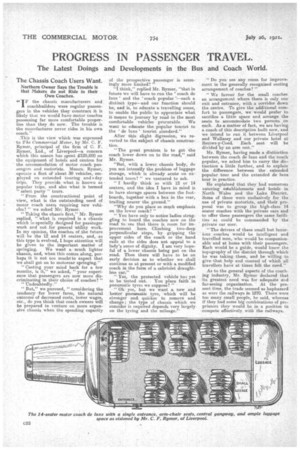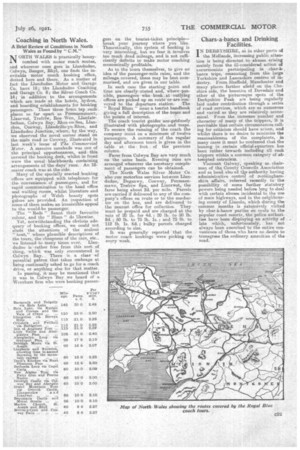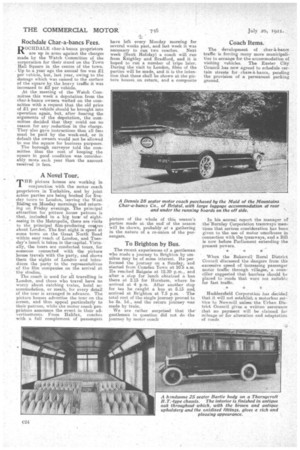PROGRESS IN PASSENGER TRAVEL.
Page 20

Page 21

Page 22

If you've noticed an error in this article please click here to report it so we can fix it.
The Latest Doings and Developments in the Bus and Coach World.
The Chassis Coach Users Want,
Northern Owner Says. the Trouble is that Makers do not Ride in their Own Coaches.
44 IF the chassis. manufacturers and
coachbuilders were regular passengers in the vehicles they construct it is likely that we would have motor coaches possessing far more comfortable properties than they do now The trouble is the manufacturer never rides in his own coach."
This is the view which was expressed to The C'ommereial Motor, by Mr. 0. F. Rymer, principal of the firm of C. F. Rymer, Ltd., of Liverpool—a concern which this season has spent £125,000 on the equipment of hotels and centres for the accommodation of motor coach. passengers and motorists. Messrs. Rymer, operate a fleet of about 30 vehicles, employed on extended touring and s day trips. They provide what is known as popular trips, and also what is termed " select party " tours.
" From the constructional point of view,, what is. the outstanding need of motor coach users requiring new vehicles? " we asked Mr: Rymer.
" Taking the chassis first," Mr. Rymer replied, ".what is required is a chassis which isspeoially designed for passenger work and not.f or general utility work. In my opinion, the coaches of the future will be the 12 and 14 seaters, and, as this type is evolved, I hope attention will be given to the important matter of springing. We want a much lighter chassis, and, when this comes along, perhaps it is not too muchtto expect that we shall get on to motorcar springing."
"Casting your mind back for a few months, is it," we asked, " your experience that. passengers are now more discriminating in their choice of coaches! " " Undotibtedly."
"But," we pursued, "considering the tendency -for lower fares, the natural outcome of decreased costs, loU,er wages, etc., do you think that coach owners will be prepared to venture on more expensive chassis when the spending capacity
of the prospective passenger is seemingly more limited? "
• "I think," replied Mr. Rymer, "that in future we will have to run the coach de luxe ' and the coach popular '—each distinct type—and our function should be, and is, to educate a travelling sense, to enable the public to appreciate what it means to journey by road in the most comfortable vehicles procurable. We want to educate the popular tourist to the de luxe' tourist standard."
After this slight digression, we reverted to the subject of chassis construction.
"The great problem is to get the coach lower down on to the road," said Mr. Rymer.
"But, with a lower chassis body, do you not intensify the problem of luggage storage, which is already acute on extended tours? " we ventured to ask.
" I hardly think so with 12 or 14 seaters, and the idea I have in mind is to have storage spaces between the footboards, together with a box in the rear, trailing nearer the ground."
"Why do you place so much emphasis on the lower coach? "
" You have only to notice ladies struggling to board the coaches now on the road to see that there is room for improvement here. Climbing two-deep perpendicular steps, by gripping the upper sides of the coach or the hand rails at the sides does not appeal to a lady's sense of dignity. I am very hopeful of a lower chassis being Rut on the road. Then there will have to be an early decision as to whether we shall continue as at present or with a modified coach in the form of a cabriolet draughtless car."
"Yes, the protected vehicle has yet to be tested out. You place faith in pneumatic tyres we suppose? "
" Oh yes, but we want a new and betoter pneumatic tyre, which will be stronger and quicker to remove and change; the type of chassis which we consider is required depends very largely on the tyring and the mileage. " Do you see any room for improvement in the generally recognized seating arrangement of coaches? "
" We favour for the small coaches an arrangement where there is only one exit and entrance, with a corridor down the centre. To give the additional comfort to passengers, we would prefer to sacrifice a little space and arrange the seats to accommodate two persons on each. As a matter of fact, we are having a coach of this description built now, and we intend to run it between Liverpool and Wallasey and our private hotel at Bettws-y-Coed. Each seat Will be divided by an arm rest."
Rymer, having made a distinction between the coach de luxe and the Coach popular, we asked him to carry the distinction a little further, and to explain the difference between the extended popular tour and the extended de luxe tour in practice.
He explained that they had numerous catering establishments and hotels in North Wales and the Lake District. Some of these were exclusively for the use of private motorists, and their proposal was to group the high-class 14 seater coaches with the private cars and to offer these passengers the same.facilities as could be commanded by the private car user.
"The drivers of these small but luxurious coaches would be intelligent and travelled men, who would be companionable and at home with their passengers.Each would be a guide, would know the topography of the district through which he was taking thein, and be willing to give that help and counsel of which all travellers have at times felt the need."
As to the general aspects of the coaching industry, Mr. Rymer declared that its greatest need was for adequate and far-seeing organization. At the present time, the trade seemed as haphazard as were the railways in 1870. There were too many small people, he said, whereas if they had some big combinations of proprietors they would be in a position to .:compete effectively, with the railways.
Coaching in North Wales.
A Brief Review of Conditions in North Wales as Found by "CM.', NORM WALES is practically honeycombed with motor roach routes, and wherever ones goes in Llandudno, Colwyn, Bangor, Ethyl, one finds the inevitable motor coach booking office, dotted here and there. As a matter of fact the Llandudno Motor and Garage Co. have 19; ths Llandudno Coaching and Garage Co. 8; the Silver-Coach Co. 14; in addition to the arrangements . which are made at the hotels, hydros, and boarding establishments for booking passengers. These three firma tap such places so. far apart as Penmaeninawr, Islanrwst, Trefriw, Roe Wen, ,Llaniairfechan, Colwyn Bay, Rhos-on-Sea, Ilan. rhos, Conway, Llandrillo-yri-Rhos, and Llandudno Junction, Where, by the way, we observed the novel corner stand on the main road to Conway, illustrated in last week's issue of The Commercial Motor. A massive sunshade was one of the principal appurtenances, and this covered the booking desk, whilst in front were the usual blackboards containing arrangements of the days' runs. An 18seater coach was at the side.
Many of the specially erected booking offices are equipped with telephones for the convenience of passengers, and for rapid c,ommunication to the head office and waiting rooms, whilst literature and photographs of Welsh beauty spots galore are provided. An inspection of some of them makes an irresistible appeal to the would-be passenger. The " Reds " flaunt their favourite colour, and the " Blues " do likewise. Yet, notwithstanding the obvious adequacy of booking offices, we could not elude the attentions of the zealous " tout," whose plausible descriptions of the tours, the cheapness of the cars, etc.. we listened to many times over. Llandudno is rather free from this sort of thing, which was only encountered in Colwyn Bay. There is a class of potential patron that takes umbrage at being continually asked to go for a coach drive, or anything else for that matter.
In passing, it may be mentioned that. it. was in Colwyn Bay we heard of a Wrexham firm who were booking passen
gess on the tourist-ticket principle— break your journey where you like. Theoretically, this system of booking is very interesting, but we fear it involves too much dead mileage and is not sufficiently definite to make motor coaching economically profitable.
As to the tours themselves, to give an idea of the passenger-mile rates, and the mileage covered, these may be best summarized, and are given in our table.
In each case the starting point and time are clerirly-•stated and, where pessible, passengers Who 'seek .at outlying offices are picked up en route or are conveyed to the departure station. The "Royal Blues " issue a tourist handbook giving a full description of the tours and the points of interest. The Coach tourist guides arespitfusely illustrated with photographs .and maps. To ensure the running of the. coach the company insist on a minimum of twelve passengers. A summary of the regular day and afternoon tours is given in the table at the foot of the previous column.
Fares from Colwyn Bay are very much on the same basis. Evening runs are arranged wherever the necetsary complement of passengers can be obtained.
The North Wales Silver Motor Co, also' runmotorbus services between Llandudno, Deganwy, Conway, Penmaenmawr' Trefriw Spa, and Llanrwst, the fares being about 2d. per mile. Parcels are carried if delivered to any of the company's offices en route or to the conductor on the bus, and are delivered to the nearest office for collection. They must be prepaid and are charged at the rate of 20 lb. for 4d. ; 20 lb. to 50 lb. 8d. ; 50 lb. to 75 lb. is.; and 75 lb. to 112 lb. is. fid.; bulky parcels charged according to size.
It was generally reported that the motor coach bookings were picking up every week.
Chars-a-bancs and Drinking, Facilities,
IN DERBYSHIRE, as in other parts of the Midlands, increasing public attention is being directed to abuses arising mainly from the ill-considered action of excursionists participating in char-a-, banes trips, emanating from the large Yorkshire and Lancashire centres of industry. From Sheffield, Manchester and many places farther afield on the Cheshire side, the beauties of Dovedale and other of the picturesque spots of the Derbyshire Peak are being regularly laid under contribution through a series of road services, which are as numerous and varied as they i are relatively economical. From the immense number and character of many of the trippers, it is inevitable that certain circumstances calling for criticism should have arisen, and whilst there is no desire to minimize the reasonableness of the complaints, in many cases it must. be confessed that the leaning in certain official ',quarters has been rather towards including all such trippers within a common category of attempted ostracism. Viscount Galway, speaking as. chairman of the County Councils Association and as head alsu of the authority having administrative control of A ottinghainshire affairs, referred recently to the possibility of some further statutory powers being needed before long to deal with certain abuses incidental to the use of main highways, and in the neighbouring county of Lincoln, which during the summer. months is extensively visited by char-it-hence parties en route to the popular coast resorts, the police authorities have been displaying an activity of late which, unfortunately, has not always been exercised to the entire convenience of those who have no desire to rtronsgress the ordinary amenities of the
Rochdale Char-a-bancs Fees.
ROCHDALE char-à-banes proprietors are up in arms against the charges made by the Watch Committee of the corporation for their stand on the Town " Hall Square in the centre of the town. . Up to a year ago the annual fee was £1 per vehicle, but, last year, owing to the damage which -was caused to the surface of the square by the heavy traffic it was increased to £3 per vehicle.
At the meeting of the Watch Committee this week a deputation from the char-a-bancs owners waited on the committee with a request that the old price of £1 per vehicle should be brought into operation again, but, after hearing the arguments of the deputation, the 'committee decided that they could see no reason for any reduction in the charge. They also gave instructions that all fees must be paid by the week-end, or in default the owners would not be allowed to use the square for business purposes. The borough surveyor told the committee that the cost of keeping the square in good condition was considerably more each year than the amount received in fees.
A Novel Tour.
THE;picture houses are working in conjunction with the motor coach proprietors in Yorkshire, and, by joint action parties are being booked for fiveday tours to London, leaving the West Riding on Monday mornings and returning on Friday evenings. The principal attraction for picture house patrons is that, included in a big tom of sightseeing in the Metropolis, there are visits to the principal film-producing centres about London. The first night is spent at some town on the Great North Road within easy reach of London, and Tuesday's lunch is taken in the-capital. Virtually, the tours are conducted tours, for someone connected with th(3 picture house travels with the party, and shows them the sights of London and introduces the party to the representatives of thefilm companies on the arrival at the studios.
The coach is used for all travelling in London, and those who travel have no worry about catching trains, hotel accommodation, or meals, for eery detail of the tour is arranged in advance. The picture houses advertise the tour on tho screen, and thus appeal particularly to their patrons, while the motor coach propietors announce the event in their advs tisements. From Halifax, coaches with a full complement of passenger's have left, every Monday morning for several weeks past, and last week it was
necessary to run two coaches. Next week (Bank Holiday) a coach will run from Keighley and Bradford, and it is hoped to run a number of trips later. During the visit to London, films of the parties will be made, and it is the intention that these shall be shown at the picture houses on return, and a composite picture of the. whole of this season's parties made at the end of the season will be shown, probably at a gathering iu the nature of a re-union of the passengers.
To Brighton by Bus.
The recent experiences of a gentleman who made a journey to Brighton by omnibus may be of some interest. He performed the journey on a Sunday, and started from Camden Town at 10.5 a.m. He reached Reigate at 12.30 p.m., and after a stop for lunch obtained a bus there at 2.15 for Horsham, where he arrived at 4 p.m. After another stop for tea he caught a bus at 5.15 and. arrived at Brighton at 7.5 p.m. The total cost of the single journey proved to be 8s. id., and the return journey was made by train.
We are rather surprised that the gentleman in question did not do the journey by motor coach.
Coach Items.
The development of char-i-banes traffic is forcing many more municipalities to arrange for the accommodation of visiting vehicles. The Exeter City Council has now agreed to schedule certain streets for chars-iiebancs, pending the provision of a permanent parking ground.
In his annual report the manager of the' Burnley Corporation tramways•mentions that serious consideration has been given to the use of motor omnibuses in connection with the tramways, and a Bill is now before Parliament extending the present powers.
When the Bakewell Rural District Council discussed the dangers from the .excessive speed of increasing passenger motor traffic through villages, a councillor suggested that barriers should be placed to roads that were not suitable for fast traffic.
Huddersfield Corporation has decided that it will not establish, a motorbus service to Newmill unless the Urban District Council gives a written assurance that no payment will be claimed for mileage or for alteration and adaptation of roads
































